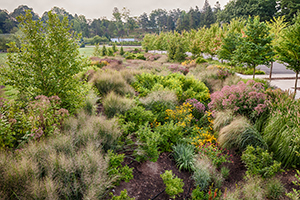The Landscape Architecture Foundation publishes comprehensive study of Cornell Plantations’ bioswale garden
Published:
4 years 22 weeks ago  he Landscape Architecture Foundation (LAF) has published a comprehensive case study of the bioswale garden at Cornell Plantations. This is the first Cornell University site chosen for the LAF’s case study program, and was selected because the LAF believes the site shows the potential for a demonstration of substantial landscape benefits. The study was conducted by Michele Palmer, of dba Templeton Landscape Architecture & Planning located in Cooperstown, NY, in 2014.
he Landscape Architecture Foundation (LAF) has published a comprehensive case study of the bioswale garden at Cornell Plantations. This is the first Cornell University site chosen for the LAF’s case study program, and was selected because the LAF believes the site shows the potential for a demonstration of substantial landscape benefits. The study was conducted by Michele Palmer, of dba Templeton Landscape Architecture & Planning located in Cooperstown, NY, in 2014.The bioswale was installed as part of the Nevin Welcome Center building project in 2010. The project, which includes a green roof, and several other sustainable features, received LEED Gold from the U.S. Building Council. The bioswale was designed to slow and clean storm water runoff from the parking lot while providing an attractive garden landscape, which is more ecologically-minded than a traditional storm drain system. The garden is used as a teaching landscape to showcase the benefits and functions of a bioswale garden.
The landscape surrounding the Nevin Welcome Center serves as a pedestrian-friendly gateway to the adjacent 25-acre botanical garden and features a lush horticultural display with interpretive signage that articulates some of the ecosystem services provided by the bioswale, filter practices, and green roof.
Some of the bioswale's performance benefits found by Palmer are:
• Eliminates an estimated 78,000 gallons of runoff per year, reducing annual stormwater runoff from the site by 31%.
• Increases biodiversity. The bioswale contains over 50 plant species, giving it a Reciprocal Simpson Index of 11.5, which is 26.3 times higher than that of a turfgrass seed mix typically used for dry swales.
• Provides recreational and educational opportunities for an estimated 50,000 visitors per year based on 2013 counts. 68% of 71 survey respondents achieved the bioswale learning objectives, answering 7 out of 9 questions correctly.
• Helps galvanize visitor interest and support for green infrastructure. 92% of the 71 survey participants said they were interested in seeing green infrastructure in their communities, and 52% report that they are likely to install smaller scale practices in their home landscape.
“We are honored to be selected for this case study program,” stated Dr. Christopher Dunn, the E. N. Wilds director of Cornell Plantations. “The bioswale garden has quickly become one of the premier gardens of its kind, inspiring other botanic gardens to create similar landscapes, as well as inspiring visitors to create similar gardens in their communities and in their own backyards.”
The bioswale garden was designed by Tobias Wolf of Wolf Lighthall Landscape Architecture and Planning, along with Mary Hirshfeld, retired director of horticulture for Cornell Plantations and Irene Lekstutis, landscape designer at Cornell Plantations.
To see the full results of the LAF study please visit: https://lafoundation.org/research/landscape-performance-series/case-studies/case-study/740/



